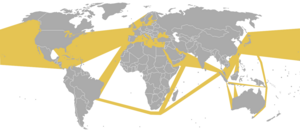
Water pollution occurs when a body of water is affected by any materials that are harmful to any organism that lives in it, drinks it or uses it. The sources of water pollution can be categorised as:
- Direct pollution: When the polluting material is discharged directly to the body of water.
- Indirect pollution: When a polluting material finds its way indirectly into the body of water (e.g. nitrogen pollution of ditches by the run-off from fertilised agricultural land).
Possible solutions[edit | edit source]
Causes[edit | edit source]

Water pollution can be caused by both organic and inorganic materials.
Approximately 1.4 billion pounds of trash enters the ocean every year.[1]
Chemical pollution[edit | edit source]
These are mainly chemicals that do not naturally occur in aquatic ecosystems. The greatest chemical pollutants are herbicides, pesticides and industrial compounds.
Organic pollutants[edit | edit source]
Organic pollutants include manure or sewage, which, when large volumes enter the water, cause a deterioration in the water quality. Organic material is decomposed in water course by aerobic bacteria. These require a great deal of oxygen and as they increase, the dissolved oxygen level in the water decreases, increasing the Biological Oxygen Demand (BOD)W of the water. This lack of oxygen can kill aquatic organisms. As the aquatic organisms die, they are broken down by more aerobic organisms, which leads to even more oxygen depletion.
This type of pollution can also occur when inorganic chemicals such as nitrogen and phosphates are added to aquatic ecosystems. These chemicals are plant fertilisers and cause an overgrowth of algae. As the algae dies, they add to the organic material in the water, which as it decomposes, lowers the oxygen level. This process is called eutrophication.
Heat pollution[edit | edit source]
Thermal pollution can occur when water is used as a coolant for industrial purposes. When it is returned to the river it is at a higher temperature. The level of oxygen that can be dissolved in water decreases as water temperature increases, so this also leads to oxygen depletion of the watercourse.
Natural pollution[edit | edit source]
Pollution can be caused by a natural event such as an earthquake, volcanic eruption or landslide. All these events can result in excess undesirable materials entering watercourses, lakes, etc.


